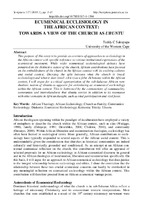| dc.contributor.author | Sakupapa, Teddy C. | |
| dc.date.accessioned | 2019-10-29T09:42:19Z | |
| dc.date.available | 2019-10-29T09:42:19Z | |
| dc.date.issued | 2018 | |
| dc.identifier.citation | Sakupapa, Teddy C. (2018). Ecumenical ecclesiology in the African context: towards a view of the church as Ubuntu. Scriptura, 117, 1-15. https://dx.doi.org/10.7833/117-1-1384 | en_US |
| dc.identifier.issn | 2305-445X | |
| dc.identifier.uri | http://dx.doi.org/10.7833/117-1-1384 | |
| dc.identifier.uri | http://hdl.handle.net/10566/5067 | |
| dc.description.abstract | This purpose of this essay is to provide an overview of approaches to ecclesiology in the African context with specific reference to various institutional expressions of the ecumenical movement. While wider ecumenical ecclesiological debates have pondered on the distinctive nature of the church, African contributions have focused on the embeddedness of the church in the African context with its evolving cultures and social context. Decrying the split between what the church is (read: ecclesiology) and what it does (read: ethics) as a false dichotomy within the African context, I will argue for a critical appropriation of the sub-Saharan African nondualistic notion of ubuntu as apposite for articulating an ecumenical ecclesiology within the African context. This is buttressed by the connotations of communality, communion and interrelatedness that ubuntu carries in addition to its resonance with other concepts in African thought, such as vital participation and vital force. | en_US |
| dc.language.iso | en | en_US |
| dc.publisher | Stellenbosch University | en_US |
| dc.subject | Diakonia | en_US |
| dc.subject | African theology | en_US |
| dc.subject | African ecclesiology | en_US |
| dc.subject | Ubuntu | en_US |
| dc.subject | Trinity | en_US |
| dc.title | Ecumenical ecclesiology in the African context: towards a view of the church as Ubuntu | en_US |
| dc.type | Article | en_US |

